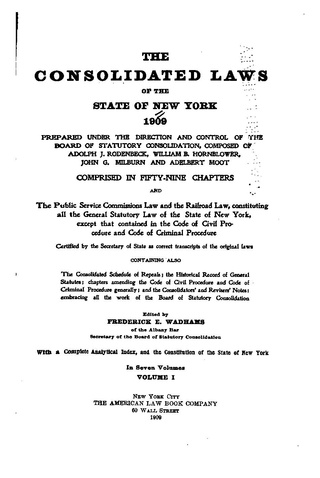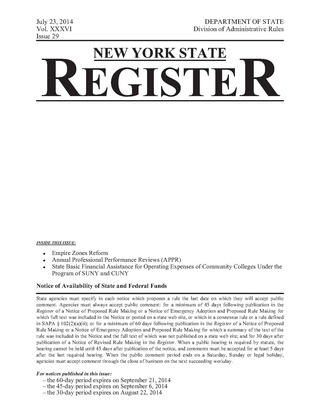Related Research Articles

The Federal Communications Commission (FCC) is an independent agency of the United States government that regulates communications by radio, television, wire, satellite, and cable across the United States. The FCC maintains jurisdiction over the areas of broadband access, fair competition, radio frequency use, media responsibility, public safety, and homeland security.

The Communications Act of 1934 is a United States federal law signed by President Franklin D. Roosevelt on June 19, 1934, and codified as Chapter 5 of Title 47 of the United States Code, 47 U.S.C. § 151 et seq. The act replaced the Federal Radio Commission with the Federal Communications Commission (FCC). It also transferred regulation of interstate telephone services from the Interstate Commerce Commission to the FCC.

The government of New York City, headquartered at New York City Hall in Lower Manhattan, is organized under the New York City Charter and provides for a mayor-council system. The mayor is elected to a four-year term and is responsible for the administration of city government. The New York City Council is a unicameral body consisting of 51 members, each elected from a geographic district, normally for four-year terms. Primary elections for local offices use ranked choice voting, while general elections use plurality voting. All elected officials are subject to a two consecutive-term limit. The court system consists of two citywide courts and three statewide courts.

The Federal Register is the official journal of the federal government of the United States that contains government agency rules, proposed rules, and public notices. It is published every weekday, except on federal holidays. The final rules promulgated by a federal agency and published in the Federal Register are ultimately reorganized by topic or subject matter and codified in the Code of Federal Regulations (CFR), which is updated quarterly.
In administrative law, rulemaking is the process that executive and independent agencies use to create, or promulgate, regulations. In general, legislatures first set broad policy mandates by passing statutes, then agencies create more detailed regulations through rulemaking.

The New York City Department of Health and Mental Hygiene is the department of the government of New York City responsible for public health along with issuing birth certificates, dog licenses, and conducting restaurant inspection and enforcement. The New York City Board of Health is part of the department. Its regulations are compiled in title 24 of the New York City Rules. Since March 2022, the commissioner has been Ashwin Vasan.

A law library is a special library used by law students, lawyers, judges and their law clerks, historians, and other scholars of legal history in order to research the law. Law libraries are also used by people who draft or advocate for new laws, e.g. legislators and others who work in state government, local government, and legislative counsel offices or the U.S. Office of Law Revision Counsel and lobbying professionals. Self-represented, or pro se, litigants also use law libraries.
Telephone call recording laws are legislation enacted in many jurisdictions, such as countries, states, provinces, that regulate the practice of telephone call recording. Call recording or monitoring is permitted or restricted with various levels of privacy protection, law enforcement requirements, anti-fraud measures, or individual party consent.

The secretary of state of New York is a cabinet officer in the government of the U.S. state of New York who leads the Department of State (NYSDOS).

The Government of the State of New York, headquartered at the New York State Capitol in Albany, encompasses the administrative structure of the U.S. state of New York, as established by the state's constitution. Analogously to the US federal government, it is composed of three branches: executive, legislative, and judicial. The head of the executive is the governor. The Legislature consists of the Senate and the Assembly. The Unified Court System consists of the Court of Appeals and lower courts. The state is also divided into counties, cities, towns, and villages, which are all municipal corporations with their own government.
The New York City Law Department, also known as the Office of the Corporation Counsel, is the department of the government of New York City responsible for most of the city's legal affairs. The department is headed by the Corporation Counsel, currently Sylvia Hinds-Radix, the 81st official to hold this position.

The Department of Housing Preservation and Development (HPD) is the department of the government of New York City responsible for developing and maintaining the city's stock of affordable housing. Its regulations are compiled in title 28 of the New York City Rules. The Department is headed by a Commissioner, who is appointed by and reports directly to the Mayor. The current Commissioner of HPD is Adolfo Carrión Jr. appointed in January, 2022 by Mayor Eric Adams replacing Louise Carroll, who was appointed by Mayor Bill de Blasio in May 2019. Other former Commissioners have included Maria Torres-Springer, Vicki Been, Jerilyn Perine, Richard Roberts and Shaun Donovan, among others. HPD is headquartered in Lower Manhattan, and includes smaller branch offices in each of the city's five boroughs.
Information technology law(IT law) or information, communication and technology law (ICT law) (also called cyberlaw) concerns the juridical regulation of information technology, its possibilities and the consequences of its use, including computing, software coding, artificial intelligence, the internet and virtual worlds. The ICT field of law comprises elements of various branches of law, originating under various acts or statutes of parliaments, the common and continental law and international law. Some important areas it covers are information and data, communication, and information technology, both software and hardware and technical communications technology, including coding and protocols.
The New York City Office of Technology and Innovation (OTI), formerly known as the Department of Information Technology and Telecommunications (DoITT), is the department of the government of New York City that oversees the City's "use of existing and emerging technologies in government operations, and its delivery of services to the public". Although the agency's primary purpose is to facilitate the technology needs of other New York City agencies, the department is best known by city residents for running the city's 3-1-1 "citizens' hotline," established in 2003. Its regulations are compiled in title 67 of the New York City Rules.

The New York State Department of State (NYSDOS) is the department of the New York state government under the leadership of the Secretary of State of New York. Its regulations are compiled in title 19 of the New York Codes, Rules and Regulations.

The law of New York consists of several levels, including constitutional, statutory, regulatory and case law, and also includes local laws, ordinances, and regulations. The Consolidated Laws form the general statutory law.

The Consolidated Laws of the State of New York are the codification of the permanent laws of a general nature of New York enacted by the New York State Legislature.

The New York State Register is the official journal of the New York state government that contains information on proposed regulations and rulemaking activities. The New York State Register is published weekly by the New York State Department of State's Division of Administrative Rules. The general and permanent regulations are compiled in the New York Codes, Rules and Regulations (NYCRR).

The City Record is the official journal of New York City. It is published each weekday and contains legal notices produced by city agencies, including notices of proposed and adopted rules, procurement solicitations and awards, upcoming public hearings and meetings, public auctions and property dispositions, and selected court decisions. Despite the publication's importance, long history, and influence—many city projects are required to be announced in the paper—the existence of the Record is not well known.
The Administrative Code of the City of New York contains the codified local laws of New York City as enacted by the New York City Council and Mayor. As of February 2023, it contains 37 titles, numbered 1 through 16, 16-A, 16-B, 17 through 20, 20-A, 21, 21-A, and 22 through 33.
References
- 1 2 Gibson, Ellen M.; Manz, William H. (2004). Gibson's New York Legal Research Guide (PDF) (3rd ed.). Wm. S. Hein Publishing. p. 473. ISBN 1-57588-728-2. LCCN 2004042477. OCLC 54455036.
- 1 2 "New York City, NY Laws". American Legal Publishing Corporation.
- ↑ Durkin, Erin (26 May 2014). "Councilman Ben Kallos wants city to publish government notices on its website". New York Daily News .
- ↑ New York City Charter § 1066